As an Amazon Associate, we earn from qualifying purchases with no additional costs for you.
Japan and Germany are countries renowned for the quality of their craftsmanship and attention to detail in the products they manufacture. This statement holds true for the knives that come out of these two countries as well. How do the German and Japanese knives stack up against each other, and which is better?
9 differences between Japanese and German knives:
- Steel composition.
- Hardness of the steel.
- Thickness of the steel.
- Edge retention.
- Durability
- Sharpness
- Ease of sharpening
- Weight
- Purpose-built use.
Japanese knives are sharp and precise. German knives are durable and multipurpose.
Japanese knives are sought-after knives for the kitchen and fetch a high price in comparison to other knives. German manufacturing also produces some respected kitchen knife brands that are widely used across the world. So, what features separate Japanese knives from German knives, and which would be the better choice for your kitchen?
If you are interested in checking out the best Japanese knives (made by Hayate Yoshihiro) we recommend and use, you can find them by clicking here (Amazon link).
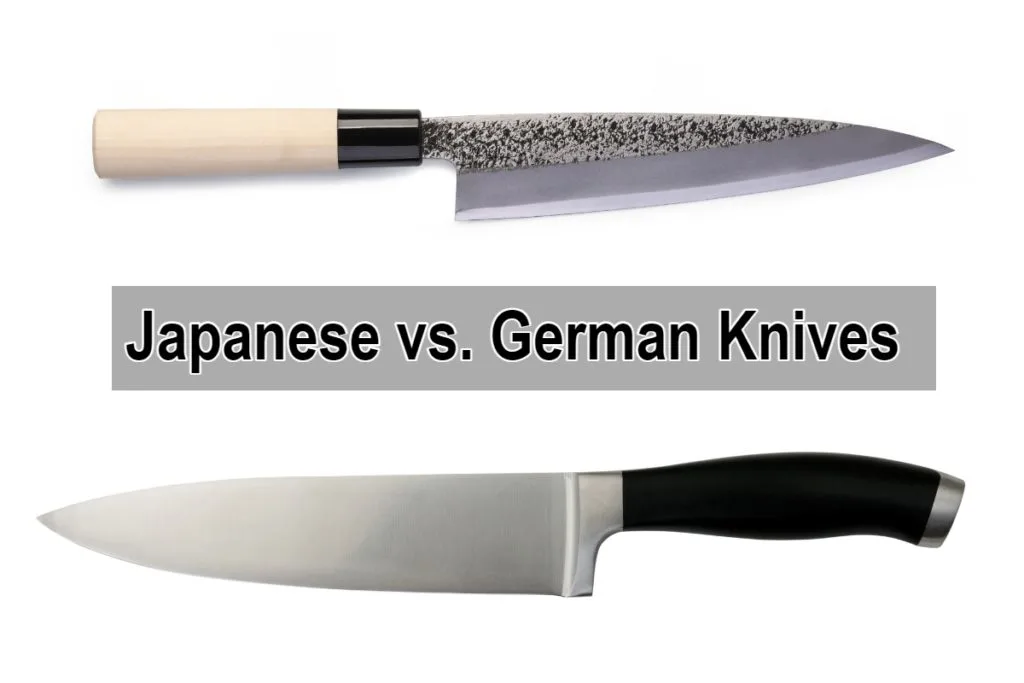
Japanese Knives Vs. German Knives: Honest Comparison
Japanese and German knives are both quality products, but there are significant differences in the features and characteristics between these knives that draw a distinct line between the two.
Some of the differences relate to the intended purpose of the knives, and some to the manufacturing techniques and finishing. However, the most defining difference is the steel used in the manufacture of the knives.
1. Japanese Steel Vs. German Steel
The steel type used to manufacture a knife will influence many of the knife’s characteristics, such as how thin the blade can be, how sharp the knife can be, the edge retention, and the durability of the edge.
The type of steel will also affect how easy or difficult the knife will be to sharpen and the overall weight of the knife.
Japanese steel has a significantly higher carbon content than steel originating in the Western world, including German steel. Much of the carbon-holding ability of the steel has to do with the quality of the original ore.
Japan has been blessed with high-quality ore deposits, allowing their steel to have a higher carbon content than other steels.
The smelting process of combining carbon with iron also plays a role in the steel quality, and the Japanese have been perfecting this art for hundreds of years.
This is not to say that the German steel is of poor quality, but rather that the Japanese steel is better. The quality of the steel imparts certain characteristics to the knife, which would not be possible with other steels.
2. Japanese Vs. German Knives: Hardness Of The Blades
The hardness of steel is measured using a system called the Rockwell scale, which is designated by HRC. The level to which the blade can be hardened is determined by the carbon content in the steel.
Due to Japanese steel having a higher carbon content, the steel can be hardened to a significantly higher level than German steel.
German steel for knives is typically hardened to 57-HRC, while Japanese steel can be hardened to 60 to 63-HRC, and, in some cases, 65-HRC.
Very hard steel, such as Japanese steel, has its pros and cons, and in some purposes, softer steel, such as German steel, has benefits over harder steel.
TIP: Hardness of the blade in really important. But do you know what knife steel is the easiest to sharpen? This is also really important to know so find out the answer in the article below
List Of The Easiest Knife Steels To Sharpen (With Examples)
3. Japanese Vs. German Knives: Thickness Of The Blades
Japanese knife blades are thinner than German knife blades. This is another characteristic that is influenced by the quality of the steel.
Due to the higher hardness level of Japanese steel, the steel for the knife blade can be made thinner. Consequently, most German kitchen knives have thicker steel on the blade than Japanese knives.
4. Japanese Vs. German Knives: Edge Retention
Edge retention is how long the knife will stay sharp before needing to be re-sharpened or requiring touch-ups to the edge.
The Japanese knives have superior edge retention over German knives. This is once again a characteristic of steel. Because Japanese steel can be hardened to a greater level than German steel, the edge on a Japanese knife is harder than that of German knives.
This translates to Japanese knives having better edge retention than German knives, but the hardness of the steel does come with some disadvantages, such as the durability of the edge.
5. Japanese Vs. German Knives: Durability
Durability between German and Japanese knives is where the German steel and its characteristics outshine the Japanese steel.
The high level of hardness of the Japanese knives makes the edge very brittle. The edge can crack or chip if the knife is misused or dropped. In some cases of misuse, the tip of a Japanese knife can shear off completely.
Since German steel is softer, it is not prone to this kind of damage if the knife is misused or dropped. The steel may bend, but it is unlikely to crack, chip, or sheer off.
Another aspect of durability is the resistance of the steel to rust. The high carbon content of Japanese steel makes it more susceptible to rust than German steel.
German steel has the advantage of higher chromium levels, which makes the steel more rust and stain-resistant than Japanese steel.
To sum up the durability, German knives have a more durable edge than Japanese knives and are less prone to rust and stain than Japanese knives.
6. Japanese Vs. German Knives: Sharpness
Japanese knives are made from thinner, harder steel, which affects the level to which the knife can be sharpened. This advantage of the Japanese steel allows these knives to be sharpened to a higher degree of sharpness than German knives.
German knives can be extremely sharp, but Japanese knives go beyond this and can be scalpel-sharp. This allows for a much more precise and cleaner cut from a Japanese knife than its German counterpart.
Consequently, Japanese knives are preferred for decorative and precise cutting of ingredients to improve the quality of the food presentation.
TIP: The best way to sharpen a knife is using whetstone. You can find different types of whetstones on the market. One of the common whetstones are oil stones and water stones. Find out the difference between these two stones in the article below:
Oil Stone Vs. Water Stone: What’s The Difference?
7. Japanese Vs. German Knives: Ease of Sharpening
German kitchen knives are easier to sharpen than Japanese knives and can be sharpened by the knife owner with a medium level of knife sharpening skills.
The thinness of the steel in Japanese knives and the hardness of the steel make them more difficult to sharpen.
A good level of skill is required to sharpen these knives to get the angles on the cutting edge correct. The hardness of the steel means that the knives take longer to sharpen than German knives.
Many Japanese knife owners will have their knives professionally sharpened rather than trying to sharpen the knives themselves.
This is due to the skill level required to sharpen these knives correctly, and if they are sharpened incorrectly, it could damage the knife.
German knives are more forgiving in the sharpening department. Consequently, German kitchen knife owners feel more confident in sharpening these knives themselves.
BTW: If you want to know more about Japanese and other knives and their sharpening, check out the books listed above. These books are recommended by professional sharpeners and knife makers (Amazon links):
- Japanese Kitchen Knives: Essential Techniques and Recipes
- The Knifenerd Guide to Japanese Knives
- Knife: The Culture, Craft, and Cult of the Cook’s Knife
- Sharp: The Definitive Introduction to Knives, Sharpening, and Cutting Techniques, with Recipes from Great Chefs
8. Japanese Vs. German Knives: Weight
German knives are heavier than Japanese knives due to two main reasons. The first is that Japanese steel is lighter due to its higher carbon content. The higher carbon content makes Japanese steel lighter per volume than other steel, including German steel.
Another aspect that affects the knife’s weight is the thickness of the steel used to manufacture the knife. The steel used in German knives is thicker than that used on Japanese knives, which adds to the knife’s overall weight.
These two weight factors result in a significant weight difference in the hand between these knives, with German knives being weightier.
TIP: Weight is one the important factors when buying a new knife. Find out the exact weights for different types of knives in the article below:
Knife Weight: Exact Values For All Types In Grams & Pounds
9. Japanese Vs. German Knives: Purpose-Built Use
Japanese kitchen knives are designed with a particular purpose in mind. Due to the fragility of the edge, you cannot use one of these knives other than for its intended purpose in the kitchen.
Using a Japanese knife inappropriately runs the risk of damaging the sharp edge by chipping, cracking, or even snapping the blade.
Due to the limited purposes for each Japanese knife, there are many different knives made for different purposes in the kitchen.
The thicker, softer steel of the German knives makes them more versatile in the kitchen. They can be considered more multipurpose in the kitchen than Japanese knives.
To summarize this characteristic of these knives, you will need many more Japanese knives in your kitchen to fulfill the necessary roles in the kitchen than German knives, which are multipurpose.
What Is The Difference Between German Knives And Japanese Knives?
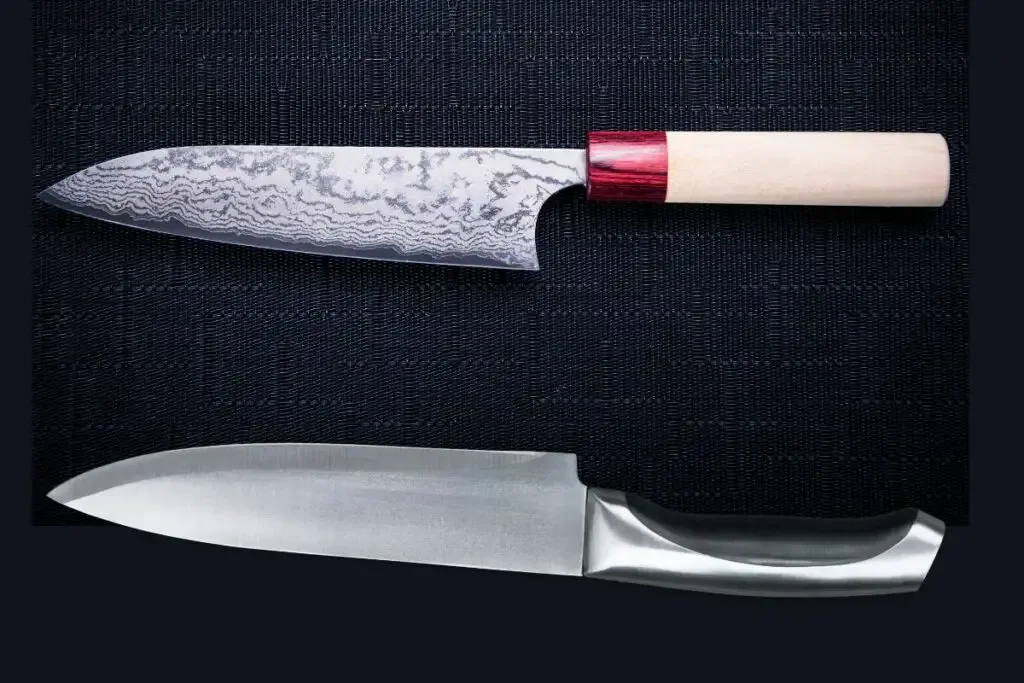
As we have already discussed, there are fundamental differences between knives originating from these two countries.
Both are very good tools to have in your kitchen and will perform admirably, but Japanese knives simply perform certain tasks better than any other knife.
Here is a quick summary to illustrate the main differences between German and Japanese knives.
| Steel | High carbon steel | Lower carbon content, but more Chromium |
| Hardness | Very hard steel | Softer steel |
| Edge Retention | Very good edge retention | Good edge retention but not as good as Japanese knives |
| Durability | Not durable. The hardness of the steel makes the edge brittle and prone to chipping and cracking if not used correctly. More prone to rust and staining | Very durable. Edge will not crack or chip as easily but can fold over. This can be fixed with a hone to restore the edge. Higher rust and stain resistance. |
| Sharpness | Very sharp, but harder to sharpen. | Sharp, but not as sharp as Japanese knives. Easier to sharpen. |
| Versatility | Not multipurpose. Knives are purpose-built and should not be used outside these parameters. | Multipurpose, requiring fewer knives for kitchen tasks |
| Cost | Expensive to purchase and maintain. | Less expensive and cheaper to maintain. |
If you are interested in checking out the best German knives we recommend buying knives made by Wüsthof company. You can find them by clicking here (Amazon link).
Are Japanese Knives Better Than German Knives?
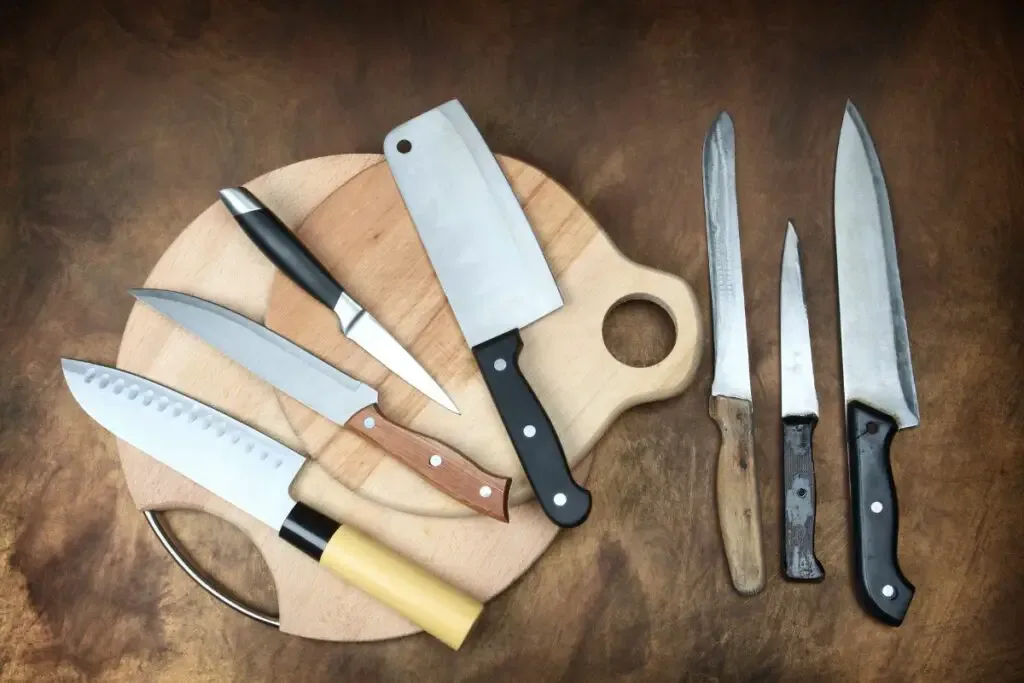
Because Japanese knives are purpose-built, each knife has characteristics that make it work exceptionally well for the intended purpose.
Japanese knives will operate better in the selected task than German-made knives. However, Japanese knives require more care when using them and require a higher level of maintenance to keep them in prime working condition.
Japanese knives are more difficult to sharpen and repair, and these tasks are often outsourced, adding to the cost of owning these knives.
Conversely, German knives are more versatile, multipurpose, and easier to maintain. They also cost less to purchase, making them more affordable to a wider range of people.
Japanese knives cut more cleanly and precisely, so if this is a requirement for the food presentation, they will perform better in this role.
Japanese knives are sharper but require more care and maintenance, and you need more knives for your kitchen. German knives are more durable but are not as sharp.
Ultimately, German and Japanese knives are both high-quality products, so you need to decide which knife would be best for you and how you work in your kitchen.
Many kitchens will have a mix of German knives and Japanese knives. The German knives would be used for multipurpose functions in the kitchen, while the use of Japanese knives would be reserved for specific tasks.
TIP: One of the most popular kitchen knives are ceramic knives. Do you know how to sharpen a ceramic knife? Find out the complete guide in the article below:
Step-By-Step Guide: How To Sharpen A Ceramic Knife
Are Japanese Knives Sharper Than German Knives?
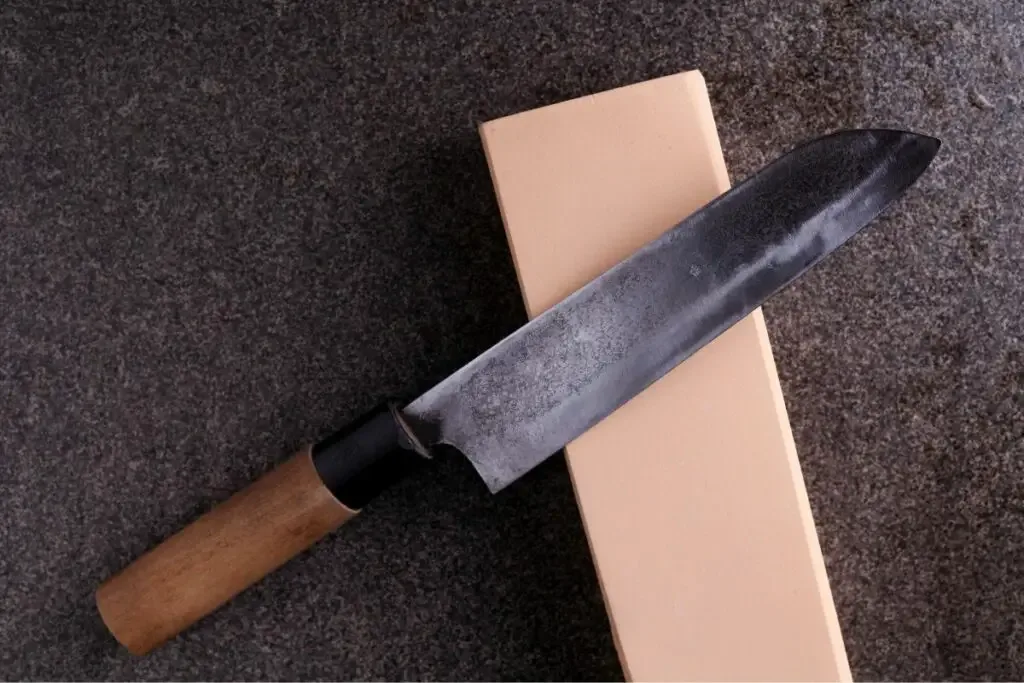
Sharpness is an important aspect of kitchen knives. We all know the saying that a sharp knife is a safe knife, and both German and Japanese knives can be extremely sharp, but there is a difference between the two.
Japanese knives are sharper than German knives. The thinner, harder Japanese steel allows for a keener edge on the Japanese blade. The steel also holds the edge better than German knives, but the edge is more brittle and prone to cracking and chipping than the edge of German knives.
German knives will require more frequent honing and sharpening than Japanese knives, but this process is easier on German knives because the steel is not as hard.
TIP: Are you looking to buy a new whetstone? Check out our recommendations (we personally use the first three ones):
Our PRO choice whetstones combo (Amazon links):
- Fixing stone: Whetstone SHAPTON Ceramic KUROMAKU #320
- Sharpening stone: Suehiro CERAX soaking whetstone: Medium #1000
- Finishing stone: Whetstone SHAPTON Ceramic KUROMAKU #5000
Our budget choice (Amazon link): Sharp Pebble Extra Large Sharpening Stone Set
Do Chefs Prefer German or Japanese Knives?
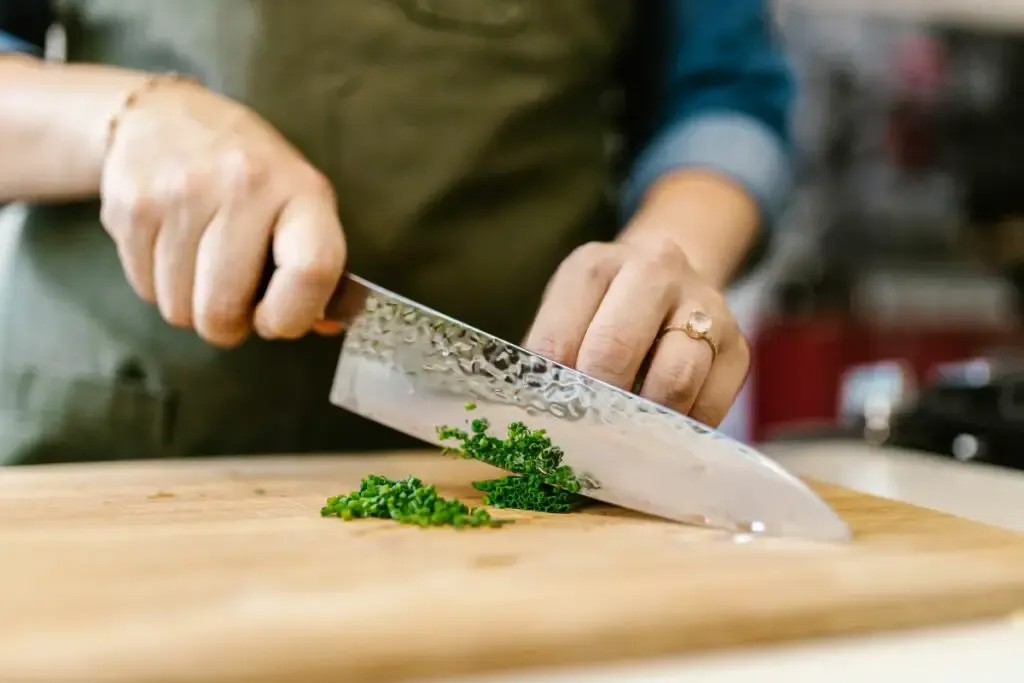
Chefs want a knife that will perform well in the kitchen, which is why most chefs will have both Japanese and German knives in their kitchen.
Chefs may prefer to use a Japanese knife for precise, clean cuts on ingredients for dishes that require a certain level of presentation, but German knives as more general-purpose knives in the kitchen. Most chefs will have a variety of Japanese and German knives in their kitchen.
Japanese knives generally do not have a curved edge since they are mostly designed for slicing or straight up and down chopping. Many Western chefs have been trained to chop ingredients quickly with a rocking chopping motion.
German knives have a more curved edge to accommodate this type of chopping style, which makes these knives more appropriate for this technique in the kitchen.
FAQ
Q: Why Choose Japanese Knives for Your Kitchen?
A: Japanese knives are renowned for their sharpness, precision, and lightweight design, making them ideal for delicate and precise cutting tasks. They are often chosen by chefs and home cooks who prioritize precision and clean cuts, especially for tasks like sushi preparation and vegetable slicing.
Q: How Do I Maintain the Sharpness of Japanese and German Knives?
A: Japanese knives, known for their acute sharpness, require regular honing and careful storage to maintain the edge. German knives, while also requiring honing, are a bit more forgiving and can be sharpened easily at home. Both benefit from professional sharpening occasionally to preserve their optimal performance.
Q: Is There a Price Difference Between Japanese and German Knives?
A: Generally, Japanese knives can be more expensive due to the intricate craftsmanship and high-quality steel used. German knives can be more budget-friendly and offer excellent durability and versatility, making them a great investment for various cooking needs.
Q: Which Knife Type is Better for Professional Cooking: Japanese or German?
A: Both Japanese and German knives have their unique advantages that cater to different cooking styles. Japanese knives are favored for their precision and sharpness, while German knives are appreciated for their durability and versatility. Professional chefs often utilize both types, selecting the most suitable knife based on the specific culinary task.
Q: How Do I Choose Between a Japanese and a German Knife as a Home Cook?
A: Consider your cooking style, budget, and maintenance preference. If you engage in tasks requiring precision and delicate cuts, Japanese might be the way to go. For a multipurpose, durable option, especially if you’re a beginner, German knives might be more suitable.
Q: Can I Use Japanese Knives for Heavy-Duty Kitchen Tasks?
A: Japanese knives are typically not recommended for heavy-duty tasks like cutting through bones or frozen foods due to their thin and sharp edges, which can chip. For such tasks, the robust and durable design of German knives is more appropriate.
Q: How Do the Blade Designs of Japanese and German Knives Differ?
A: Japanese knives often feature thinner, sharper blades with a focus on precise, clean cuts. German knives typically have a more curved blade profile, suitable for rocking chopping motions, and are generally thicker and more robust.
Conclusion
The kitchen knives produced by Germany and Japan are quality products that any chef would welcome as effective tools in their kitchen.
Each of these knife types has its strong points and weaknesses in various roles in the kitchen, which is why most kitchens carry a variety of German and Japanese kitchen knives.
Japanese are the precision tools in the kitchen, used for specific tasks to achieve a particular effect with the ingredients. German knives are workhorse knives that are used in multipurpose roles in the kitchen.
TIP: Rust on your Japanese knife can cause damage to the blade. Do you know how to remove rust from a knife and how to prevent a knife from rusting? Check out the complete guide in the article below:
Removing Rust From A Japanese Knife In 5 Steps (+ Prevention)
